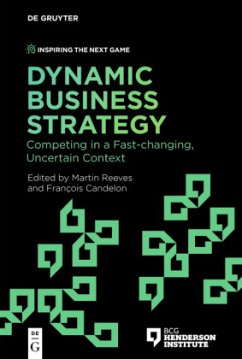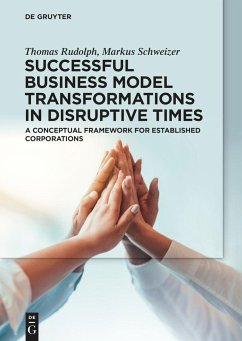
Mastering the Science of Organizational Change
Versandkostenfrei!
Versandfertig in 1-2 Wochen
19,99 €
inkl. MwSt.

PAYBACK Punkte
10 °P sammeln!
As the business context evolves more rapidly, driven by accelerating technological, political, and social change, an increasing strategic priority for business leaders is how to enact large-scale organizational change. Even companies that are current industry leaders are vulnerable to disruption. Company leaders need to watch over their shoulder for-and transform the company in anticipation of-the next disruption.Mastering the Science of Organizational Change summarizes the work of the BCG Henderson Institute and its fellows and ambassadors over several years to develop a more scientific appro...
As the business context evolves more rapidly, driven by accelerating technological, political, and social change, an increasing strategic priority for business leaders is how to enact large-scale organizational change. Even companies that are current industry leaders are vulnerable to disruption. Company leaders need to watch over their shoulder for-and transform the company in anticipation of-the next disruption.
Mastering the Science of Organizational Change summarizes the work of the BCG Henderson Institute and its fellows and ambassadors over several years to develop a more scientific approach to change. Hundreds of companies are analyzed in the book's discussion on how to beat the odds in large-scale change management using an evidence-based approach-a large-scale analysis of what approaches actually work in which circumstances.
Part 1 of the book reviews the imperatives for self-disruption. The second part elaborates on how to manage the process of change. Finally, Part 3 discusses how organizations can take change to the next level.
Events around the book
Link to a De Gruyter online event in which, Martin Reeves, Chairman of the BCG Henderson Institute, will share lessons on how to develop a more scientific approach to change including how to self disrupt, how to manage the process of change, and how organizations can take change to the next level:
https://youtu.be/TfzFllmL4Cg
Mastering the Science of Organizational Change summarizes the work of the BCG Henderson Institute and its fellows and ambassadors over several years to develop a more scientific approach to change. Hundreds of companies are analyzed in the book's discussion on how to beat the odds in large-scale change management using an evidence-based approach-a large-scale analysis of what approaches actually work in which circumstances.
Part 1 of the book reviews the imperatives for self-disruption. The second part elaborates on how to manage the process of change. Finally, Part 3 discusses how organizations can take change to the next level.
Events around the book
Link to a De Gruyter online event in which, Martin Reeves, Chairman of the BCG Henderson Institute, will share lessons on how to develop a more scientific approach to change including how to self disrupt, how to manage the process of change, and how organizations can take change to the next level:
https://youtu.be/TfzFllmL4Cg












